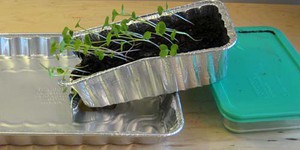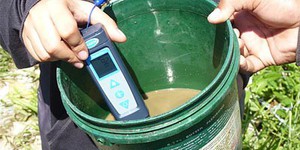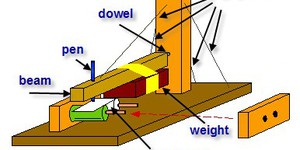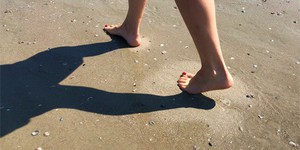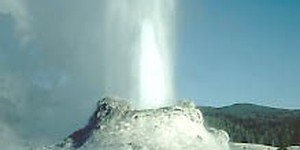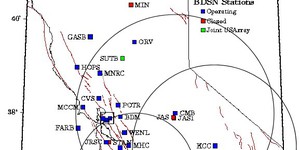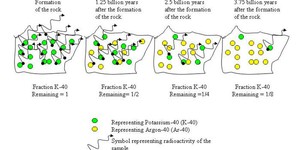Eighth Grade, Geology Science Projects (26 results)
Geologists study the Earth, trying to understand the forces that gradually shape and change the landscape and ocean floor, as well as forces that make themselves felt more suddenly, like earthquakes and volcanoes. The information geologist discover helps in many ways, from keeping populations safe from disasters like landslides to uncovering important ore deposits like titanium used for surgical equipment.
|
Select a resource
Sort by
|
Soil erosion can cost the world billions of dollars every year by washing pollutants into our streams and rivers and by causing the loss of farmland. What can you do about this problem? Help save the world (and some money!) with nothing more than a few plants!
Read more
Featured
Have you heard that garlic powder is supposed to inhibit the growth of bacteria? Which do you think would make a better disinfectant: a solution of garlic powder or a solution of bleach? This project shows you a straightforward way to compare the effectiveness of different disinfectants (or other antimicrobial agents), by measuring zones of inhibition on a culture plate.
Read more
Did you know that soils can be alkaline, neutral, or acidic? Most plants grow best in soil near neutral pH, but some plants prefer slightly acidic and others slightly alkaline soil. What is the pH of the soil in your garden? What happens to the pH of water that comes in contact with soil? In this science project you will get to find out.
Read more
New
Engineers are trying to tackle the world's ocean pollution problem using robots. Some robots, like Mr. Trash Wheel and the ship featured in this Mark Rober video, are stationary and collect trash as it flows out of rivers before it gets into the ocean. Others, like the Jellyfishbot, are mobile and can squeeze into narrower spaces to collect trash:
Can you build and test your own trash-skimming robot? If you do not have access to a natural body of water to test it in, you can use a bathtub or a…
Read more
The papier-mâché volcano is a real classic, but there are many other ways to make an even more exciting and interesting science project focused on volcanoes!
To get started on your own volcano-based science project, you will want to first have an understanding of how volcanoes form. This is related to tectonic plates. The entire outer shell of the Earth, known as the lithosphere, is made up of tectonic plates that are constantly moving. There are seven or eight large tectonic…
Read more
If you live in an area where earthquakes happen, you might be especially interested in this science project. You will learn how to build your own seismograph and how to use it to detect ground motion.
Read more
Did you ever notice the cool patterns around your footprints when you take a walk in the wet sand at the beach? The pressure of your feet has effects far outside your footprints. Here's a project that uses a simple experimental apparatus to investigate how the volume of wet sand changes under pressure.
Read more
New
Artificial intelligence (AI) programs can now generate photorealistic pictures of people who do not exist in the real world. How can you tell if a picture is of a real person or a fake, AI-generated person? What features of the picture do people use to decide whether the face is real or AI-generated? In this project, you will explore these questions as you ask volunteers to look at both real and AI-generated pictures of human faces.
Read more
Our home, Earth, is a living planet. Earthquakes and volcanic eruptions are proof that the geological forces that shaped our planet and created the land masses are ongoing. An amazing example of geologic activity that is less damaging is a geyser. In this geology science fair project, you will build a model geyser and determine how depth of the source affects how the water is ejected. By the end of this project, you will know a lot more about geysers and understand that a geyser is much more…
Read more
When an earthquake happens, how are scientists able to determine the original location of the quake? In this project, you'll use archived data from a network of seismometers to find out for yourself. You'll create your own seismograms from the comfort of your own computer with an easy-to-use webpage interface. Then you'll analyze your seismograms to determine the distance of the quake from each seismometer station. By mapping your analyzed data, you will be able to determine the location of the…
Read more
Visit the USGS Earthquake Hazards Program to find out about global patterns of earthquake incidents (USGS, 2006). Can mapping earthquakes help identify fault lines? They also have a list of science fair project ideas. Another great resource for earthquake-oriented science fair projects is by Jeffery Barker (Barker, 1994). Build a model to study the forces of an earthquake using sandpaper-covered blocks. What are the forces involved? How are stress and friction in balance along a fault line?…
Read more
What do rocks and clocks have in common? Both keep track of time.
Yes, radioactive isotopes present in rocks and other ancient material decay atom by atom at a steady rate, much as clocks tick time away. Geologists use those radioactive isotopes to date volcanic ash or granite formations like the giant Half Dome in Yosemite National Park. Anthropologists, archeologists, and paleontologists also use radioactive isotopes to date mummies, pottery, and dinosaur fossils. Does this sound abstract…
Read more
Is soil structure an important factor in earthquake dynamics? Investigate soil liquefaction and how different soil types respond to earthquake movements. Are movements more dramatic in sandy/loamy or clay type soils? Which soil structures are most stable? Which are the most volatile? (MCEER, 2005)
Read more
|
Explore Our Science Videos
Can you solve this air pressure puzzle?
Flying Helicopters on Mars - Paper Models
How to Make Paper Circuits

